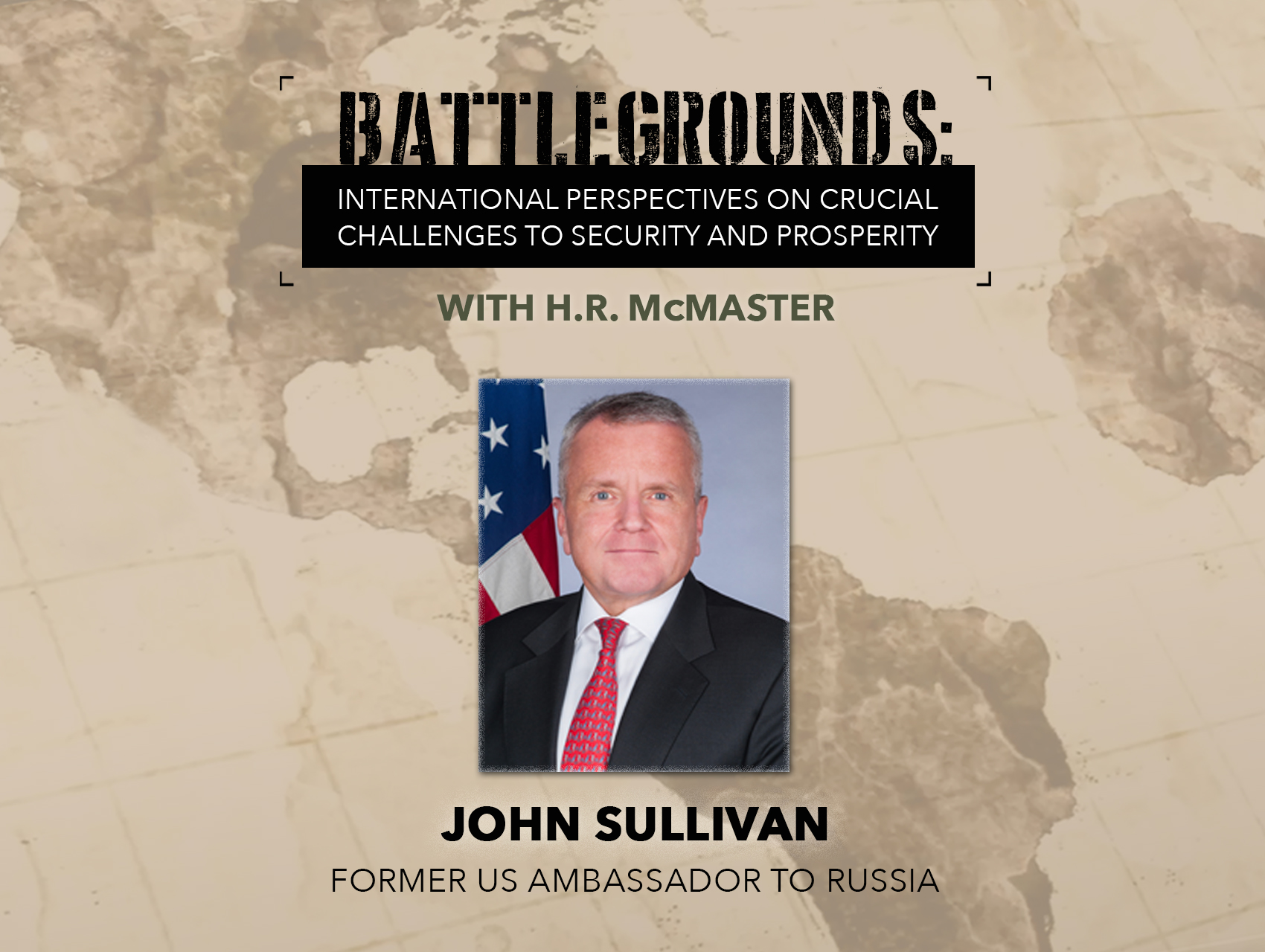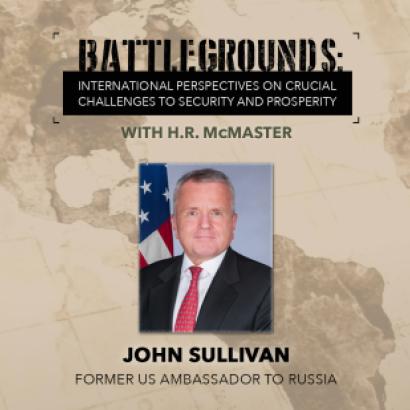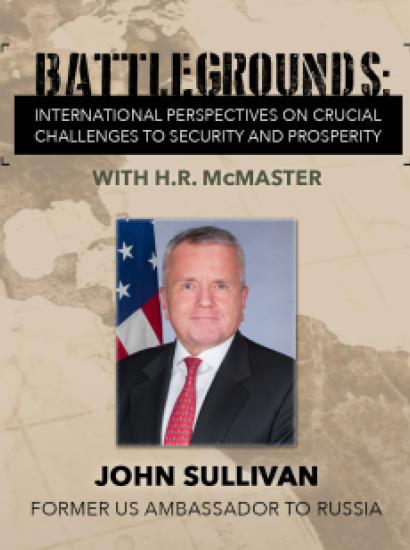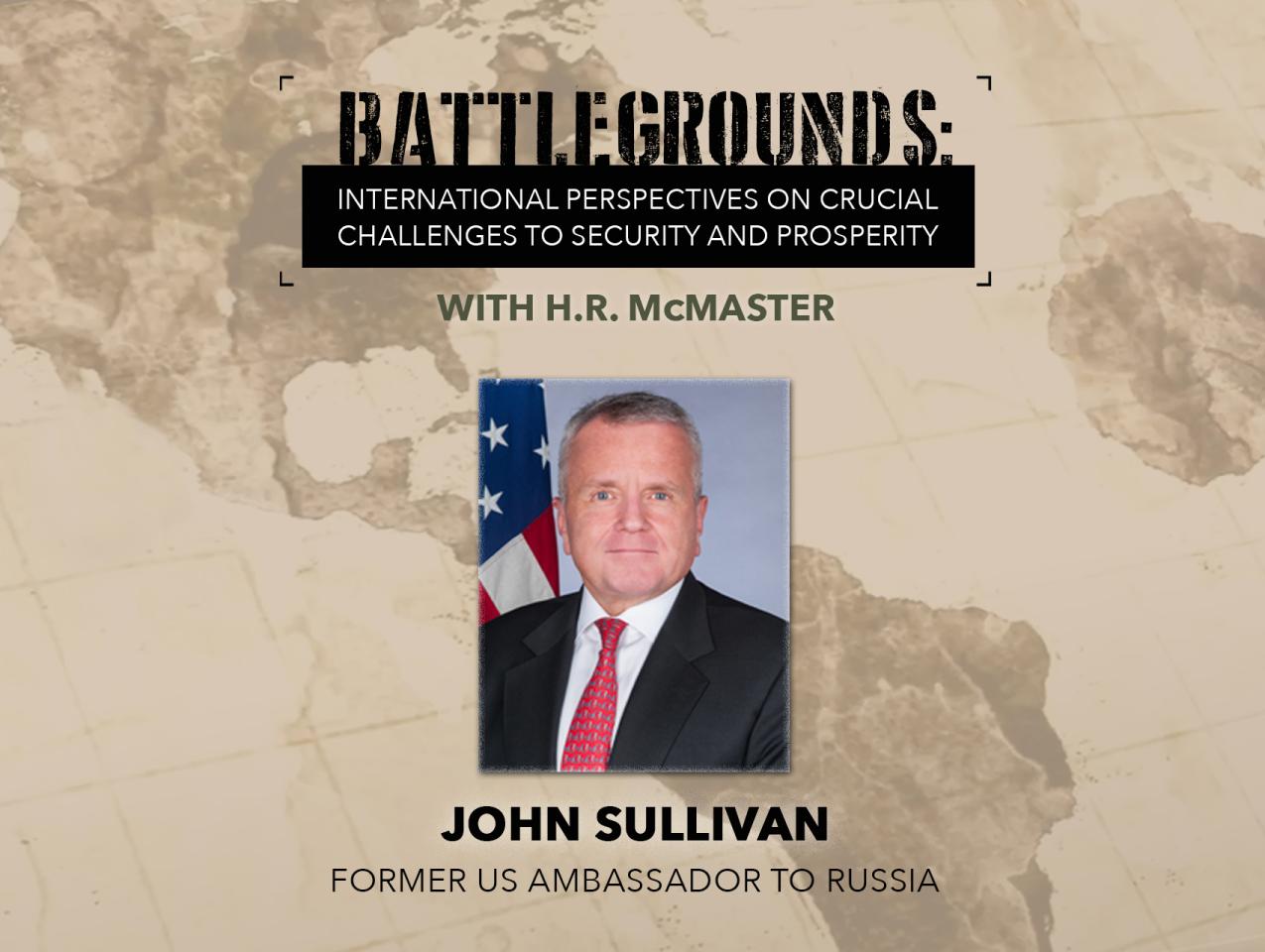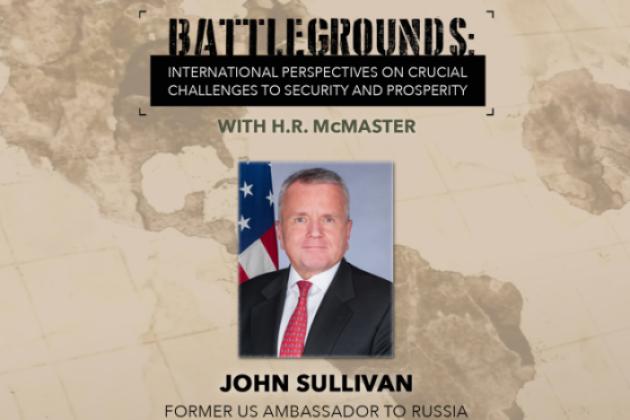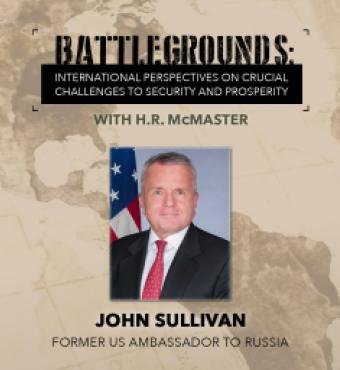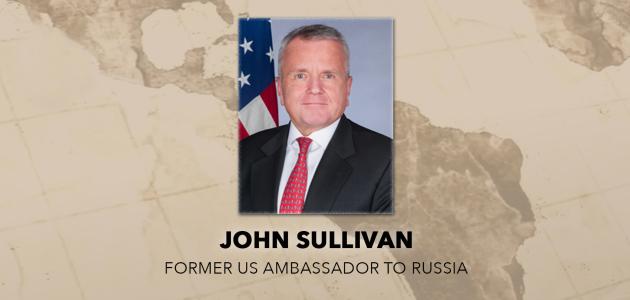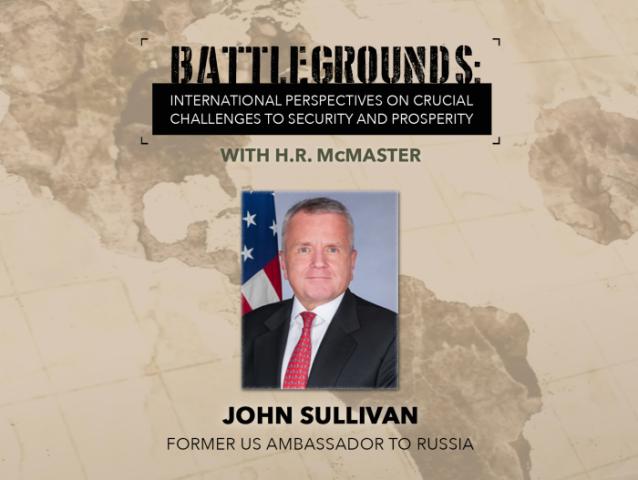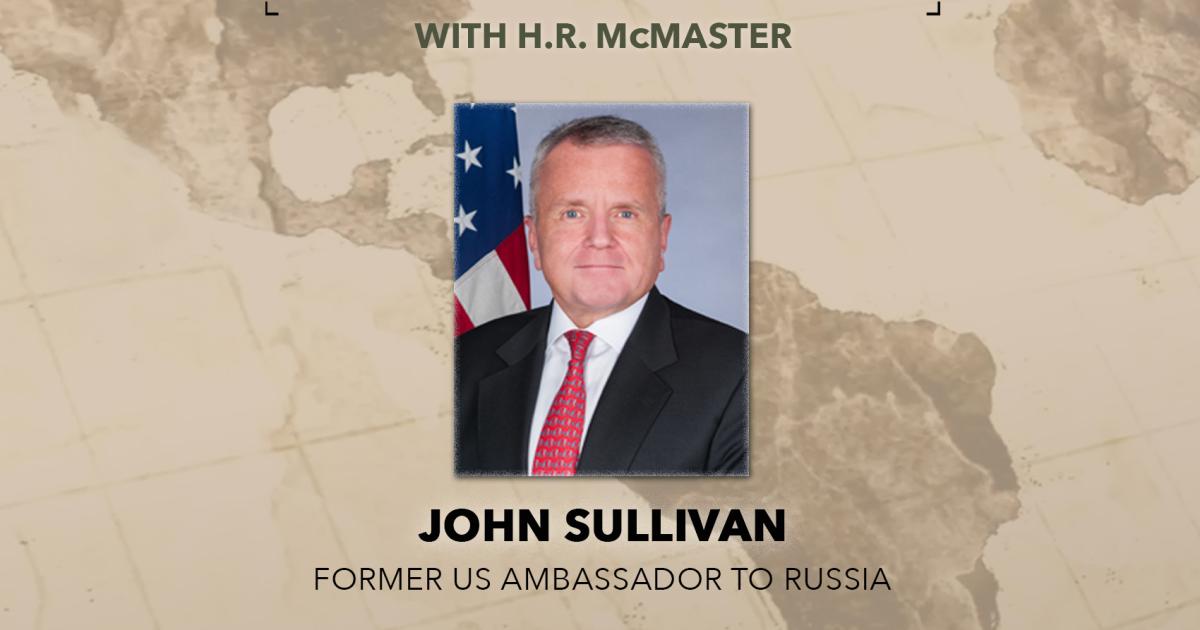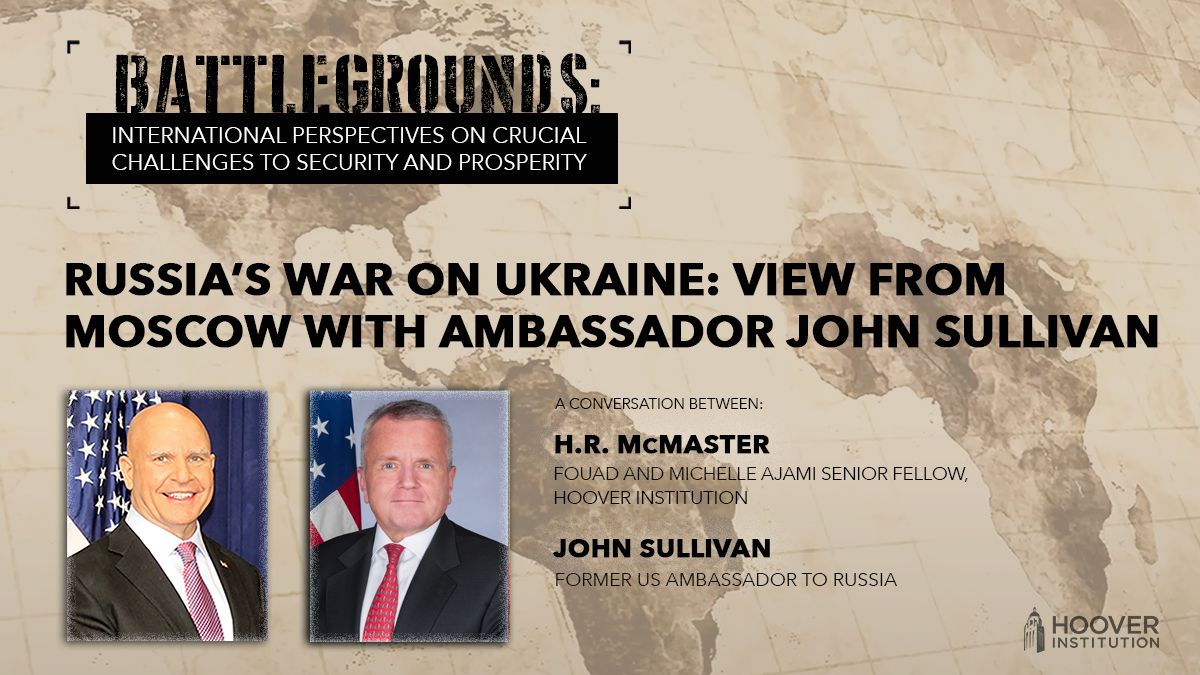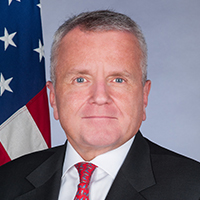
In this episode of Battlegrounds, H.R. McMaster and Ambassador John Sullivan discuss Russia's aggression, its impact on the US and NATO, and the future of Ukraine on Wednesday, July 12, 2023.
Reflecting on Russia’s history of aggression and Putin’s imperial ambitions, former US ambassador to Russia John Sullivan joins Hoover senior fellow H.R. McMaster to discuss the 2022 reinvasion of Ukraine and its impact on the US and NATO. Drawing on his experience under the Biden administration in the lead-up to the reinvasion, Ambassador Sullivan assesses the current state of the war, its historical similarities with Hitler’s invasion of Poland in 1939, the uncertain future facing Putin, and how the war in Ukraine may come to an end.
>> H.R. McMaster: America and other free and open societies face crucial challenges and opportunities abroad that affect security and prosperity at home. This is a series of conversations with guests who bring deep understanding of today's battlegrounds and creative ideas about how to compete, overcome challenges, capitalize on opportunities, and secure a a better future.
I am H.R McMaster, this is Battlegrounds.
>> Jenn Henry: On today's episode of Battlegrounds, our focus is on Russia and Ukraine. Our guest is Ambassador John Sullivan, US ambassador to Russia from December 2019 to October 2022. Sullivan completed his law degree at Columbia University and has held senior positions in the departments of Justice, Defense and Commerce in the George W Bush and Obama administrations.
He served as deputy secretary of Commerce from 2008 to 2009 and chaired the US-Iraq Business Dialogue from 2010 to 2016. Sullivan served as deputy secretary of state from 2017 to 2019. As ambassador to Russia, Sullivan led the us diplomatic operations in Moscow through Russia's 2022 re-invasion of Ukraine.
He is currently a partner in Mayor Brown's Washington, DC and New York offices. Russia's reinvasion of Ukraine fits a pattern of aggression visible from the early two thousands. In 2004, the Kremlin attempted to assassinate Ukrainian presidential candidate Viktor Yushchenko. In 2007, after Estonia removed a statue of a Red army soldier in Tallinn, Russia incited riots and initiated a major denial of service attack against Estonian banks, government bodies and media outlets.
In 2008, Russia invaded Georgia and changed European borders by force for the first time since World War II. In 2014, Russian troops invaded Ukraine and forced an illegal annexation of Crimea. Prior to the invasion, Russia backed pro Kremlin separatist movements in eastern Ukraine and used disinformation to cloak its brazen aggression.
The Ukrainian people have courageously resisted Russia`s invasion under the leadership of President Volodymyr Zelenskyy. As of June 2023, Russia controls nearly 15% of Ukraine. But Ukraine's heroic defense and counteroffensive have inflicted massive losses on Russian forces as Putin succeeded mainly in isolating Russia economically and diplomatically from the free world.
We welcome Ambassador Sullivan on the eve of a Ukrainian counteroffensive to discuss Russia's aggression, its impact on the US and NATO, and the future of Ukraine.
>> H.R. McMaster: Ambassador John Sullivan, welcome to Battlegrounds. It is great to see you and I've just got to tell you, of all the people I've worked with in Washington, I think I enjoyed working with you the most of just about anybody.
So great to see you again.
>> John Sullivan: You're too kind. It's great to be with you again, talking about the issues we're gonna talk about. I miss our days together back here in DC, where I'm located right now.
>> H.R. McMaster: Well, John, when we worked together, you had a pretty broad portfolio.
Deputy secretary of state, you've got the whole world to think about. But, but even in that period of time, between 2017 and 2018, we focused quite a bit on Russia and Vladimir Putin. And I think we shared the assessment, I know we did at the time, that really we had to work hard to restore deterrence with Putin.
Putin had been aggressive since he took over in 2000. You could argue, certainly after 2003, when he poisoned a presidential candidate in Ukraine. And some of the things we did in that first year was we imposed more sanctions on Russian individuals and entities in that one year than the previous eight years of the previous administration.
And we bolstered Ukraine's defenses with defensive capabilities, real lethal capabilities, the javelin missile in particular. We contested Russia in Syria and other places. And so I would love to hear your perspective because you've been coping with this, dealing with this problem quite directly across multiple administrations. And how do you think it evolved?
How do we get to where we are today with the reinvasion of Ukraine last year, in February of 2022? What is your assessment of how this threat from this revanchist, hyper nationalist regime in Russia developed?
>> John Sullivan: Well, you hit the nail on the head right there at the end.
Hr, we described it as a hyper nationalist, revanchist regime. We were approaching Russia as a country that we thought we could do, still do some business with, both as deputy secretary and even when I arrived as ambassador. I got confirmed as ambassador in December 2019, we were still looking for areas in which we could work with the Russians, whether it was strategic security talks, arms control, cyber issues, wrongfully detained Americans.
But the areas in which we could work with the Russians or at least talk with them, they were shrinking over time. And Putin, the Russian government was not dealing with us in good faith. We sort of knew it at the time and I remember talking to my colleagues at the State Department with you and your colleagues at the NSC.
We had a sense of the adversary we were dealing with, but we still approached it as Americans who didn't really have the proper assessment of the adversary/enemy that we were dealing with. He had started a conflict with us a long time ago, he now says he's at war with us.
We don't use that language and distill in describing our relationship with Russia but that's the way the Russians approached us. The Russian government under Putin, I'm not sure that there was anything we could have done, whether it was in the Trump administration or the Biden administration. That would have deterred Putin from the imperial project on which he launched the Russian Federation on February 24, 2022.
He's been working toward this for decades, in my opinion. And he was not to be deterred then and he's not gonna stop. There's no off ramp for Putin in this war, so you're right. We were tough on Russia, but we were tough on Russia the way the Germans and, excuse me, the British and the French were with the Germans before the second World War.
We thought we could do business, Chamberlain thought he could do business with the chancellor before the second world war started, and he couldn't. We couldn`t do business with Putin, we thought we could. And we weren`t the only ones, by the way, Chancellor Merkel, the German government as well, a lot of us thought we could do business and keep the Russia problem cabin, and that just wasn`t possible.
>> H.R. McMaster: John, I wont surprise you, I agree with your assessment. But there are people who say, hey, the reason why Putin invaded Ukraine and maybe even to 2014 or the Invasion of 2022, is it because he was provoked? He was provoked by the expansion of NATO, what he viewed as NATO aggression against Putin.
And of course, he has these crazy narratives of happy or De-Nazifying Ukraine and so forth. But there are many people, even in the United States and Europe, who say, hey, this is our fault. What do you say to those people, and to those who make that argument?
>> John Sullivan: Wow, I hear it all the time, H.R, you're absolutely right and it's so wrong.
Among other things, it doesn't account for the agency and the interests of Eastern Europeans, it's always phrased as, NATO is marching East. We're looking to acquire the Baltics, Poland, Czech Republic, Slovakia, etc. It doesn't account for the fact that the millions of people who live in those countries, who suffered for decades under Soviet rule, and fear the intention and motivations of the leadership in the Kremlin.
That they're the ones for their own protection, their own self interest, their own security, sought refuge in the defensive alliance, which is NATO. NATO was not an offensive alliance, as you know, as well as anyone. So I say it doesn't account for, it's a typical Russian propaganda trope, that they talk about indivisible security in Europe, which nominally means if one country is insecure, then the whole country is insecure.
But from the Russian perspective, that means if Russia's insecure, then the continent is insecure. But if we make the Ukrainians, the Poles, the Czechs insecure, that doesn't matter. And they can't do anything about it, like seek to join NATO, seek to defend themselves against the aggression, that clearly Putin's been planning for years, his aggression against Ukraine.
And one final point, and again, there's an echo of The Second World War here. Putin always loves to make references to what the Russians call The Great Patriotic War. And as ambassador, I was always careful to credit the Red Army, the Soviet peoples, for the victory over Nazi Germany, the Second World War, in which the Soviet people suffered greatly.
Millions and millions of innocent civilians killed, huge slaughter on the Eastern Front, great sacrifice by the Red Army, by the citizens of the Soviet Union. But Putin turns that victory to bolster his imperialist aggression, and he twists The Second World War, by the way, he doesn't refer to it as The Second World War.
That world war, the part of the world war in the Pacific, that minor skirmish with the Japanese that the US and other allies fought, that really doesn't count in his estimation of his accounting of The Second World War. But think about this, Putin's imperialist ambition and how he's justified this special military operation.
There are echoes of the German, the Nazi justification, Hitler's justification for invading Poland on September 1, 1939. The Germans, coming out of The First World War, from the Nazi perspective, and in more mainstream German perspective. The German people, the German Volk, the German state, was really railroaded by the Allies, shackled with enormous war reparations, having to confess to war guilt, losing portions of what was traditionally German-Prussian, German territory.
The Germans had grievances coming out of the First World War into the 1930s. Hitler seized on those, and used them as a justification for what became his own imperialist war. It started before September 1, 1939, with a whole series, whether it was the Anschluss with Austria, remilitarizing the Rhineland, the Sudeten Crisis, etc.
But the war starts on September 1, 1939, and here is Hitler's justification, which is the exact same justification Putin uses. We were screwed in a war we didn't lose 20 years ago, we lost territory in our East, prime Russian homeland, where our Germans, our people, our Volk, are now separated from us by a phony border created by others, not by us, that separates our people.
And now our people, our German Volk, are being abused by Polish barbarism. Polish barbarians are abusing Germans in what is our German homeland, and, by God, channeling Frederick the Great, I'm gonna solve that problem. And that's the same thing Putin's doing, his rationale at the start was, the great tragedy of the demise of the Soviet Union.
It wasn't the demise of communism, it was that Soviet State, when the Soviet State collapsed, the internal borders that separated the various republics of the Soviet Union, that were governed by the center in Moscow, those internal boundaries became international borders. Which separated his, just as Hitler used the possessive, his Germans, Putin does the same, his, our Russians are now on the wrong side of a phony border in our West.
In the Russian case, as opposed to with the Germans in the East, in our West or Southwest, there's a phony border that separates our Russians, who are now being abused by Ukrainian barbarism. Putin goes so far as to say, a Ukrainian genocide, and what's one lesson, if there's one lesson we can take, there are many from The Second World War.
If you've got grievances, the way to solve grievances is not by starting an international armed conflict on the continent of Europe, which is exactly what Vladimir Putin did. The United States, the West, the collective West, the Anglo-Saxons, and our vassals, all of the different names that Putin calls us, we didn't start this war.
We didn't provoke this war, we're not perfect, no country, no government, no alliances, but we didn't provoke this war. Putin calculatingly started this war to accomplish its imperial ambitions.
>> H.R. McMaster: Yeah, John, I think that you remind me of this Orwell quotation of, he who controls the present controls the past, and he who controls the past controls the future.
And I'm struck by the parallels in 1939 as well, I'm thinking of Roger Moorhouse`s book, Poland 1939, the first few chapters of that. It's exactly what Putin was doing, except maybe with modern communications. And some things, John, in life are black swans, other things are like pink flamingos, right?
Like they're right there in front of you, you know this is gonna happen.
>> John Sullivan: Yeah.
>> H.R. McMaster: Frank Hoffman makes this point oftentimes, but, I think it was pretty clear he was gonna do it, right? I mean, Putin, of course, invaded Ukraine in 2014, and then conducted a form of ethnic cleansing and consolidation of control over the territories in Donetsk, Luhansk and Crimea.
But then he telegraphed it, didn't he, John? Like in the August of 2021, when he wrote that long essay, essentially giving his version of history. And claiming that Ukraine had always been part of the Russian empire. So you were there. Could you maybe.
>> John Sullivan: Yeah.
>> H.R. McMaster: Talk about the run up to the war.
>> John Sullivan: Yeah.
>> H.R. McMaster: Read the situation, the decisions, maybe the Biden administration in that run up to the war. And then, and how you would assess that period. The period of escalating tensions and mobilization of troops and what seemed for almost a year, preparations for a reinvasion.
>> John Sullivan: So you're absolutely right, HR.
Well, I think you can actually trace it back. And you said, I think, earlier, back to 2003, you go through his Munich Security Conference speech.
>> H.R. McMaster: Speech vision towards 2008, right, I mean.
>> John Sullivan: Back to when he's lieutenant Colonel Putin in Dresden in the KGB, and he's calling back to the center, to the Lubyanka for instructions, and no one's answering the phone.
I mean, there's a lot to unpack there. But if we fast forward to the spring of 2021, where there's a buildup in southeast western Russia that was very concerning. There was a split between the UK and the United States. The United States Government's Assessment or Intelligence Community thought that this was a feint.
Putin was turning up the heat on this conflict, but wasn't going to cross the border. I think intelligence professionals and some other capitals thought that there was a greater chance that Putin would cross the border. There were various scenarios that were being sketched out about a smaller scale incursion, whether it was south across Ukraine to seize the territory.
Which they actually wound up doing successfully in the special military operation to Kherson. Seizing all of that shoreline along the sea of Azov. Securing the canal that provides aqueduct, that provides water to Crimea. There were various scenarios for what would have been an invasion of Ukraine, but on a much smaller scale.
It turns out that he wasn't ready to do anything then to cross an international border. But he left in place, and this is what people paid attention to. He left in place infrastructure, particularly in Crimea, that could be used for a subsequent invasion. And that's what he was doing.
It was a feint. It was a combination, feint exercise, partial buildup to have the infrastructure ready, whether it was depots, field hospitals, you name it. The Intelligence Community was keeping very careful track of that. And then by the early fall, late September, early October, it became clear for a variety of reasons.
Including the continuing buildup in southwestern Russia and in Crimea, that he was gonna launch an invasion. But here's the important point, though, I think. We knew he was gonna do it. We didn't know the scale. And you'll recall that President Biden said at one point in a press conference that, if it's limited.
I think he was asked something about, are you gonna be able to keep the Europeans together if and when Putin invades Ukraine? And his answer was something like, well, we'll have to see if it's a limited incursion. But maybe it would be more difficult. And that generated was unscripted.
You and I both have experience with presidents who have unscripted moments in front of a camera. It gave people some pause when he said that. But I was convinced at that point that he wasn't settling for a limited incursion into Ukraine. You pointed to the historical article he wrote, that tried to justify the case that Ukraine isn't an independent sovereign nation.
It's always been part of the Russian empire. It's Russian. It's ours. It's part of our debunked by historians across the political spectrum, phony history. But I was telling people, and particularly as the calendar turned from 2021 to 2022, that this was going to be an invasion of Ukraine.
This wasn't gonna be a limited incursion. And I said as much Secretary Blinken called me. So the invasion started on Thursday, February 24. The secretary called me. He was at the Munich Security Conference the prior week, and he called me on Saturday, February 19. And this is when I first started talking about September 1, 1939.
He wanted to know what my impressions were, how things were at the embassy, what we were hearing, and Moscow, etcetera. And I said to him, I said, it feels like it's August 31, 1939. He's gonna do it, and he's going in big. And he's not gonna settle for a limited incursion.
He's gonna wanna bring the government down. He's gonna wanna to take all of what he wants from Ukraine and leave the rest, the scraps in the west to the west. So that was my sense. But I had trouble convincing people, not Secretary Blinken. He and I were aligned on this.
But there were a number of people, and I'd cite in particular US business leaders in Russia. Who had been doing business there for years. And they just weren't willing to believe that he was really gonna do it. It was irrational, they said. The consequences will be cataclysmic for him.
It would be terrible. He's not irrational. He won't do it. And I said he is rational. It's just his definition of what's rational and what he wants is different from ours. He doesn't care if you continue to do business here. What he cares about is rebuilding. Being Vladimir the Great, who rebuilds the Russian empire.
Rejoins those parts of Ukraine that he thinks are traditionally Russian, including Kyiv to the Russkiy Mir to Russia and Belarus. Which they already have a union state arrangement with. And is basically, an adjunct to the government in the Kremlin. So people didn't wanna hear that message. They didn't believe he would do it.
They didn't believe that he would actually engage in a large scale World War II style, bombs, missiles, tanks, large envelopment movements. They didn't believe it. The most they would credit the argument that I was making was, well, maybe there'll be a small scale excursion or more to the point, that say he's bluffing.
And he's coming to you. Wants to negotiate and he's putting a gun on the table here, and that's what he's doing, but he won't pull the trigger. And my response was, he's put a Kalashnikov on the table and he's gonna pick it up and he's gonna spray the room and he doesn't care who gets killed so long as he gets what he wants.
And they'd say, you're full of it, forget about it. And those same people, on February 25th, were sending me text messages asking for the help of the US embassy, to get out of Russia. So, people just didn't wanna hear it.
>> H.R. McMaster: John, what you're laying out, I think it's just a classic case of multiple cognitive traps that people fall into based on what we might call strategic narcissism right?
Viewing the world only relation to us, and assuming that what we do or decide not to do is decisive toward achieving a favorable outcome. Or, mirror imaging the other, right? Thinking that Putin's calculation of interest must be just like ours, and neglecting to the degree to which emotion which you've talked about.
His obsession with restoring Russia to national greatness and to avenge his sense of honor lost associated with the breakup of the Soviet Union. And also the ideology that drives and constrains the other and I think his belief that his authoritarian system is superior to the decadent, weak west, so I'd like to ask you about that.
Why did he think he could get away with it? John, I'll tell you, as soon as the invasion started, I said okay, he's failed already, there's no way in hell this can work. I mean, just look at the scale on the map, look at the improvements in the Ukrainian forces that have been made, especially since 2014.
And then also, the qualitative problems in the Russian army. But I think John, we could say that what provokes Putin is the perception of weakness.
>> John Sullivan: Yeah.
>> H.R. McMaster: It was 2008, when we were preoccupied with Iraq and Afghanistan and the opposition to the Iraq war was growing and we had the financial crisis.
Whether it's 2014 with the unforged red line in Syria. And I think I can't help but draw a line John, between the humiliating surrender to the Taliban and withdraw from Afghanistan, and this reinvasion. But, what do you think, led to the decision? But also, why the hell did he think he could get it done?
He could get away with it?
>> John Sullivan: A couple of things HR, you're absolutely right about their attitude and I say that with some confidence because I was privileged to accompany, the CIA director Bill Burns. Who was sent by the president in early November of 21, as it was becoming clear to the United States government, that Putin was going to take military action in Ukraine.
To warn them that we saw what they were planning to do and that the consequences, sanctions, export controls, the economic costs alone would be substantial. There wasn't a message that you will be, opposed militarily on the battlefield in Ukraine. And as much as I like to talk about how, I was able to tell people what was gonna happen on February 24th, up to February 24th and the launching of the invasion, I failed completely.
And I would include my colleagues in the US government in the intelligence community, about our assessment of how the special, what turned out to be the special military operation would go. I thought, that Putin would maybe not on the timeframe that they had planned, which was weeks, but that they would capture Kiev.
They would do to the Ukrainians what Brezhnev and the Warsaw Pact did to the Czechs in 1968, and it was roughly.
>> H.R. McMaster: Or the Hungarians in 56.
>> John Sullivan: Or the Hungarians in 56, I focused on 68 cuz it was roughly the same, it was Warsaw Pact, mostly not Red army.
Roughly 200,000 troops, that take Prague, put on a plane, send him to Moscow, he gets reeducated and sent back. My recollection is he's sent back and he becomes a forest ranger in eastern Slovakia, they didn't kill him. But I thought that he was gonna be able to do, to Ukraine what Brezhnev did to Czechoslovakia and boy, was I and were we wrong.
And tremendous credit to President Zelensky, at a time when everyone thought he was a dead man. There was a wanted post in the Kremlin for him and his time on this earth, his days were numbered and he had the courage to say, I'm not leaving. I'm staying, we're gonna resist and we can resist and they did.
So, to your question HR, first, we the United States failed to anticipate, failed to account for two things. How incompetent and corrupt and ill planned, the special military operation was. We talk about their BTG's battalion tactical groups, and the number of troops involved, but it was much smaller than, you recognize this immediately.
Compare the size of the military that Putin used to try to conquer Ukraine, with the 1.4 million Germans that Hitler mobilized to attack the low Countries in France. France, roughly a country similar size, he thought he could do it on the cheap, he thought that, they engage in hybrid warfare, it wasn't just a military operation.
It involved the security services, principally the FSB, which includes the border guards, their national guard, the Rosgvardia. Which he's formed recently as sort of a palace guard, and the regular military and the level of corruption, the lack of training, the poor quality of the equipment and so forth.
It was all revealed, the military itself was revealed to be shockingly ill prepared. But the bigger failure, I think, was actually by the FSB. The FSB was supposed to prepare the battlefield, the FSB was supposed to have rendered Ukraine a rickety shack. Hitler described the Soviet Union before Barbarossa as a rickety shack and all we have to do is kick the door in and it will collapse, they're rotting from within.
The FSB was supposed to have rendered Ukraine that rickety shack, that the military thrusts south from Belarus, from the east in Russia and up from Crimea. They were gonna slice through what little resistance the Ukrainians could master, they would turn Ukrainians against their own government. Capture Zelensky, either he's killed or he's put on a plane and brought to Moscow, like Dubczek.
But it was the FSB, and it's a double failure right? Because they're charged with preparing the battle space, so that they have their people in place to make sure that bridges aren't blown up, when armed, Columns have to make certain movements so that they're prepared and they're prepared with an administration to go in and take over and govern the portions of Ukraine that they capture.
They weren't ready and then that's one failure. The second failure was they couldn't tell Putin that Ukraine wasn't ready to be sacked the way Putin thought it was and the way they had told him it would be. So he himself, Putin thinks from his and these are his, this is his milieu these are his people he is of the FSB, right?
Former director, his security, the secretary of his security council Nikolai Patrushev, former director of the FSB. I think as big a failure as the Russian military has been, I think the FSB is equally responsible for the failure here. So Russians not prepared or capable to do what they were supremely confident they could do in underestimating the courage and the resilience of the Ukrainians.
And not just Zelensky, but the Ukrainian people, including people who had, and this is secretary Blinken a couple of weeks ago, gave a speech in Helsinki about the strategic catastrophes that resulted from the Russian perspective of the special military operation. Even those Ukrainians who were native Russian speakers in eastern Ukraine who had attachment to Russia and the Russian homeland, turned against many of them, Russia and Putin and the Russian military for what they've done, the invasion of their country.
There's a famous image HR, I remember sitting in my office in Moscow and seeing this image and news coverage of this elderly woman in eastern Ukraine, a Babushka in eastern Ukraine, who is walking up to a fully kitted Russian soldier, I believe, paratrooper with an assault weapon, fully kitted out.
And she hands him a fistful of sunflower seeds and says put these in your pockets, so when you're dead and buried here, something good will come from your presence. And we'll have sunflower seeds that will bloom from your corpse when you're dead and buried here and I remember thinking, wow.
When you have elderly Ukrainians who were probably Russian leaning in their outlook and in their language, who are saying that to Russian soldiers, boy, that's to quote President George W Bush, that's a misunderestimation of the Ukrainians in the Ukrainian battle space.
>> H.R. McMaster: Well John, as you know, there's been tremendous suffering in Ukraine because of this onslaught the war has gone through multiple phases.
The defeat of this Russian onslaught in the spring and into the summer of 2022. Then you had some extremely successful Ukrainian counteroffensives, which took back vast swaths of territory into Donetsk and Luhansk. And then we had almost like the western front of World War one phase of the war, where it was just a grinding war of attrition.
And of course, the Ukrainian people were subjected to massive bombardment of their homes and their schools and their hospitals and their critical infrastructure. And now we are on the cusp of the Ukrainian counteroffensive as Ukraine has endeavored to generate combat power. But I think, John, we have been in a war of attrition up to this point, right, wars of attrition are decided by some sort of a combination of will which you've described through the Persona of this Ukrainian elderly woman.
But I think it's a representative of the Ukrainian population broadly and also capacity, right? The ability to fight, the ability to win on the battleground to regain control of territory and population and so what is your assessment now on both sides, right? On the Ukrainian side and on the Russian side, not to say to predict the future, but how do you think about the prospects for Ukrainian success or failure in this counter offensive?
And then maybe we could talk a little bit about what you see as a way to the end of this thing.
>> John Sullivan: Well, I have the mistakes, and I've made many in my work as ambassador in Moscow was underestimating the Ukrainians but in overestimating the Russians. But one area where I'd say, I think we in the West and particularly we in the United States, we don't understand.
A lot of people don't understand, particularly those who are saying that things like we provoked the Russians, Putin, ultimately, wars are settled at the negotiating table. I think that would have been news to General MacArthur on the deck of the battleship Missouri.
>> H.R. McMaster: Well, John, if I could just interject here, what did we hear for years about Afghanistan?
No military solution.
>> John Sullivan: Right.
>> H.R. McMaster: Well, the Taliban came up with one, didn't they?
>> John Sullivan: Yeah.
>> H.R. McMaster: I mean It's just.
>> John Sullivan: Putin, he's not quitting.
>> H.R. McMaster: No.
>> John Sullivan: And I say this to Americans, I say for those who are old enough to remember Vietnam, he can't be like LBJ.
He can't send hundreds of thousands of troops into South Vietnam and then have the Tet Offensive happen, decide, we're really. We're on the wrong side here I'm not gonna run for reelection, I'm gonna retire to the LBJ ranch and grow a beard. Putin can't do that he's all in this is I've said this in others some of our former colleagues, Fiona Hill and I have.
We're often we appear on panels and we're often in stereo saying the same thing, that he's messianic, he's got a vision and he is not gonna be deterred by large scale casualties in the Russian military, these are the way he spins it. These are the sons of Russia, the grandsons of the great heroes of the Red Army from the Great Patriotic War, who sacrificed themselves for the greater good of what Putin says, Russia but it's in fact the Soviet Union.
He's not given up and he's gonna do everything he can to wait us out and more, and he's gonna depend on relationships that he's built with his dear friend in Beijing, with the Indians, with the new government in Brazil, with the so called Global South, all those countries.
>> H.R. McMaster: The Iranians and there were thousands of drones.
>> John Sullivan: The North Koreans selling them artillery shells. What he's counting on is not just so in the United Nations, in the General Assembly, there have been several resolutions that have condemned and deplored the special military operation and over 140 countries voted for them.
35, 37 countries abstained what he's counting on is not just the. Those countries that abstained, like China, but among the 141 that voted for the resolution that condemns. And deplores the special military operation, they're still doing business with the Russians. They don't care about. They don't wanna get caught violating us sanctions, but they're not going to curtail in any way their relationship with Russia.
Putin thinks he has enough support around the world that he can continue his special military operation. Even if it takes years and years, even if it takes the rest of his tenure as president. However long he's got on God's green Earth, however long it takes, that is gonna be his accomplishment for the Russian Federation.
For the Russian empire. And what sets him apart. The way he cites Peter the gate, Catherine the Great, and so forth, he's gonna keep going. And even if there's a negotiation and a ceasefire, and here I agree with Secretary Blinken. Says this all the time when he's criticized for not trying to promote negotiations.
Now, Putin doesn't wana negotiate. And even when he says he will negotiate, he won't. He is biding his time. I get asked all the time whats the off ran, and I say he doesnt want an off ran in a Shermanesque. He would say, if offered one, I dont want it.
If you direct me to it, I wont take it. What I will take, though, is the Vladimir Vladimirovich, if were gonna use a highway or a turnpike analogy. I'll take the Vladimir Vladimirovich rest area. I'll rest and regroup. We'll lick our wounds. We'll get our military in better shape, and we'll continue to pursue this goal, which he thinks is noble.
And worth the sacrifice of a lot more Russians than have already been killed in Ukraine to date. That's the adversary we face. And that's why it's important for the United States, for any country that believes in the UN charter, to oppose Russia in Ukraine. And why I'm disappointed by many people in my own party, the Republican Party.
Who seem to think that a negotiated settlement is not only possible, but in the interest of the United States. And that is so profoundly wrong, it's hard for me to think that anybody who says it has really studied the matter carefully.
>> H.R. McMaster: Yeah, John, I think you're so right.
Putin will only stop until he's convinced he's been defeated. And as long as he can hold on to territory, I would say including Crimea, he's in a position to continue to try to choke Ukraine out. This is why I think it is immensely important for the counter offensive to succeed.
But then also for the Ukrainians to place at risk those military facilities in Crimea. And to fundamentally achieve security for Ukraine that allows it to reconstruct itself and become a viable state. Maybe along the lines of South Korea, where there's just a ceasefire, or Israel who's lived for, survived and defended itself for a long time in a very hostile neighborhood.
So, John, how do you see the course of the war going? What does Putin have left? As you mentioned, hes hoping well lose our will that the West, broadly, the free world, however you wanna characterize it. But the United States, our European allies and others, Japan and others who have supported Ukraine.
But he also could escalate either vertically or horizontally. Some people have talked about maybe his use of a tactical nuclear weapon. I dont buy it, but thats, thats a discussion that we have to have. But then also to escalate horizontally, right he's still playing a role of creating problems throughout Europe.
In Moldova, for example, in the transdistrib region, or meddling in the forthcoming Bulgarian election next year. Or stoking Serbian nationalism in the Balkan states and maybe trying to destabilize Kosovo. Continuing to, I think, destabilize Syria, West Africa. Okay, so what does Putin do? What does he have left?
And then what do you see the course of the war? How do you see the course of the war changing?
>> John Sullivan: Well, he's, he's not in a comfortable position because he's become dependent on countries that he can't bully and control. And so I just saw a news report the other day with some of the Iranian drones that have been taken.
And broken down in finding relatively recently manufactured Chinese components in those drones. So despite the chinese government, the PRC, saying that they are not providing weapons to either side, in fact, they are. In fact, they're helping the Ukrainians create drones for Russia to launch against Ukraine and kill innocent people.
By the way, a footnote, what you talk about putting at risk strategic areas for the Russians. It just amazes me how the Russians, their propaganda, where they talk about and complain about terrorist strikes by the Ukrainians. Imagine I, terrorist strikes in Belgorod. My God, they even launched some drones against Moscow.
All of this from a government that on a daily basis is launching cruise missiles, hypersonic missiles. Which maybe aren't quite as capable as President Putin thought, artillery and so forth. Killing Ukrainians on innocent people on a daily basis. So, yeah, we've gotta put at risk, I think we, the Ukrainians, those who want Ukraine to succeed.
Have to want Ukraine to put at risk that which Putin values. Only then will he stop. But the problem we confront, though, at the end, HR, is that once he stops. It's gonna be difficult for him to sell this as a victory such that he and his family, extended families, are secure.
So it's not just. I come back to my LBJ analogy. It's not just the judgment of history, his political future. It's his life. Just as Hitler was stuck in the bunker and knew that there wasn't gonna be a negotiated settlement with the allies. Putin has got to fear if there is a negotiated settlement with the Ukrainians, that is unfavorable to the Russians.
Putin's gotta worry about not only his own people, but his own government. And his life expectancy at that point, he may have a lesser chance than I thought Zelensky had on February 24 in Kiev.
>> H.R. McMaster: And, John, it is that whole hyper nationalist class of people with him, the people we know Patricia Shoigu.
>> John Sullivan: Right.
>> H.R. McMaster: Who's not the most impressive person, But Patricev is even more, I think, hyper nationalist than Putin, potentially. So I'd like to ask you, Stephen Kotkin, who's our colleague here at Hoover, a brilliant scholar of Stalin. And of the Soviet Union and of Russia. He points out that these authoritarian regimes, they don't have to be that strong, actually they have to just be stronger than any organized opposition.
>> John Sullivan: Yes.
>> H.R. McMaster: John, you've spent a lot of time in Moscow. What do you think the alternative futures are for Russia? I mean, if the Ukrainians can succeed, for example, in this offensive, they take back maybe all the territory that had been seized since 2014, it becomes kind of inescapable, right?
for the Russian people to recognize that they've suffered tremendous losses for nothing, and they've inflicted tremendous, horrible damage on their neighbor. What are the potential alternatives for the future of Russia?
>> John Sullivan: So I'll cite Vladimir Kara-Murza, a person I know whom I got to know pretty well when I was ambassador in Moscow and this is a man whom the Russian government, the security services, twice tried to kill, to poison, and is now in a labor camp in a sentence that will last the rest of his life.
This is a man who to this day, still believes that Russia and the Russians are capable of governing themselves in such a way as to become a member of the Community of Nations in a way that the Russian Federation, since Putin became president over 20 years ago, hasn't been.
I must say, he has that optimistic outlook. He's been willing to put his life on the line. I met with him, just date at the us embassy days before he was arrested, this was after the special military operation began and he was back in Russia. He had the audacity to come to the US embassy, I tried to meet with him somewhere else.
He said, no, he wanted to come to the embassy to meet with me and he said, this was it ,Putin ,this is the change that Russia needs. Putin has, by launching this special military operation, which will ultimately fail, will allow Russians to regain control of their government eventually.
That was what he believed, and he was willing to stake his life on it. And within days, he was arrested and has been sentenced, got a lengthy sentence now to spend the rest of his life in a labor camp. That's how the authoritarian government has responded, arresting whether it's Navalny, Kara-Murza and a lot of other people that we in the west have never heard of.
A large number of Russians I know, just keep their head down, particularly older ones who survived the soviet period, the tail end of the soviet period, the violence, the unrest in the 90s. They just want to go about their business, and they don't want to get involved. But the problem, HR, is there are a lot of people, including young people, who are radicalized nationalists, who have followed Putin's line.
There are terrorist organizations that we both, we in the United States and even some in the Russian government feel fear. There's something called the Russian imperial movement, RIM. And there are a lot of people in Russia who believe what Putin says, who believe what Patrice says. So it's going to be a very difficult struggle after Putin leaves the scene, whenever that is, this year, next year, sometime in the future.
But I come back to something that, the Churchill said, and this was during the civil war in Russia 100 years ago. And he said, if Russia is to be saved, it is to be saved by Russians. It's not gonna be saved by the west, it's not gonna be saved by the United States.
It's gotta be a Russian created salvation of their people. But what Putin's done is to motivate particularly the young. He characterizes this the war in Ukraine, he launched a special military operation. We in the west started a war against Russia, using Ukraine as a battering ram. So when he says war, he means the war that he says we in the west started against Russia and he now he speaks of it.
And when I say Messianic terms, he says, this is a struggle of civilizations. There is something that he believes that is the Russian civilization that is threatened by the collective west. All of the names they have for us, it's not really the west because it includes South Korea, Japan, Australia, New Zealand, you name it.
But this is a civilizational struggle that he, that, and that's the way he talks about it, as a struggle of civilizations. They issued, the Russian foreign ministry issued a new restatement of, they call it the concept of foreign relations of the Russian Federation. And on the very first page, they talk about the Russian civilization that the Russian government is defending against an onslaught by the west.
And that's what young people is motivating, those young Russians, many of them not well educated, the well educated ones, particularly those who could, had good paying jobs, have fled, which is another calamity for Russia and its future. But those who've stayed, they're buying into that, and they're getting motivated by that and that's a problem.
>> H.R. McMaster: This is why it's important for people like Vladimir Milov, others to poke holes in the, in Russia's firewall and to reach the population with alternative sources of information. John, you've been great with your time. It's been an amazing conversation. But I do want to ask you a couple more questions, the first of which is, what do you think are the most important lessons of this reinvasion of Ukraine?
I remember in 2017, December 2017, we had all given President Trump our advice on whether or not to provide javelins and other defensive capabilities to the Ukrainians. And it was a day where he was in the back dining room and I brought out a chart and I just showed him really every Russian provocation since Putin had taken over and then really what had preceded that which is usually something that indicated weakness to Putin.
And the point I was trying to make to him is that people are telling you that providing Ukraine with defensive capabilities will be provocative but actually what is provocative to Putin is weakness. And I think that's an important lesson for us to take especially as we look to maybe potential aggression from others Iran, North Korea and especially maybe China.
That's my lesson is that weakness provokes people like Putin who is I think kind of a combination of a street thug, a bully and a coward all wrapped up into one. But what are your lessons from this reinvasion and what do you think our viewers ought to know.
>> John Sullivan: So related to your point HR. We in the United States, we don't listen, and we don't study other countries and understand them. And the contrast, I would contrast that with the way the Russians study us. And I don't mean the FSB, the SVR, the Russian government, Russian news.
The average Russian knows more about what's going on in the United States than the average American knows about what's going on in the United States. The United States is at the top of the news every day, the US, NATO, etc. Now the news, particularly the state controlled channels.
It's their propaganda. But they study us and listen to us in ways that we never do, and it's not just with respect to the Russians, with anybody. We are so self absorbed and self obsessed. We project our image, our values, our thinking on others, and don't invest the time to really understand who those other people are, what motivates them.
And we, in particular, they will often tell us Putin has been telling us for a long time what his goals are and what he's gonna do. And we just don't listen, and we can't absorb it, and we don't study it, and we approach it in a very self centered way, and it's a weakness.
And my ultimate conclusion is, and I cite George Kennan for this, both his early work in the long telegram and the X article, his ultimate conclusion is with this colossus that was the Soviet Union, that he was trying to figure out its interests and so forth. His ultimate conclusion about the success in this clash, ongoing even then, between the Soviet Union and the west, between the Soviet Union and the United States, depended more on the strength of the United States internally.
This is Kennan in writing, 70, 80 years ago, not about January 6 or woke protests or whatever. Our ability to engage the world successfully and protect us interests depends more on our own internal strength, politically and economically and socially, than it does on we need to know what our opponents and our adversaries, whether they're in Moscow, Beijing, Tehran, Pyongyang, are doing.
But it ultimately depends more on our own strength, the courage of our convictions, the fact that we are willing to fight for things, for values that prior generations of Americans did. And when they didn't, they ultimately paid with the blood of more Americans. Whether it was sticking our head in the sand about what was going on in Nazi Germany in the 30s, etc.
We need to do two things. Do a better job of studying and listening to others and strengthening our own house and having the courage of our convictions.
>> H.R. McMaster: Well, I can't think of a better way to end than that. I mean, the whole inspiration for this series is this concept of strategic empathy, a term coined by my friend and historian Zachary Shore.
And you've just described strategic empathy perfectly, as well as the importance for us to regain our strategic confidence. Confidence in who we are as a people and our democratic principles and institutions and processes. And, John, you've live that across your life of service, and you've inspired many, many others through your example and through that selfless service.
I can't tell you what a privilege it is for me to have had this conversation with you. And on behalf of the Hoover Institution, thank you for helping us learn more about a critical competition that will help determine our future and the future of generations to come.
>> John Sullivan: Well, HR, it was entirely my pleasure.
It's always great to speak with you. Thank you for having me.
>> H.R. McMaster: Thanks, John.
>> Jenn Henry: Battlegrounds is a production of the Hoover Institution, where we advance ideas that define a free society. For more information about our work, to hear more of our podcasts or view our video content, please visit hoover.org.
ABOUT THE SPEAKERS

Ambassador John J. Sullivan served as US ambassador to Russia from December 2019 to October 2022 under presidents Donald Trump and Joe Biden. During his tenure, he led the US embassy in Moscow through Russia’s 2022 reinvasion of Ukraine. Sullivan completed his law degree at Columbia University and has held senior positions in the Departments of Justice, Defense, and Commerce from the George W. Bush to Obama administrations. He served as deputy secretary of commerce from 2008 to 2009 and chaired the US-Iraq Business Dialogue from 2010 to 2016. Sullivan served as deputy secretary of state from 2017 to 2019. He is a distinguished fellow of the School of Foreign Service at Georgetown University. Sullivan is currently a partner in Mayer Brown’s Washington, DC, and New York offices.
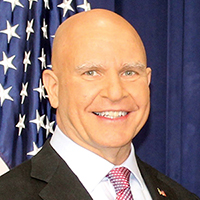
H.R. McMaster is the Fouad and Michelle Ajami Senior Fellow at the Hoover Institution, Stanford University. He is also the Bernard and Susan Liautaud Fellow at the Freeman Spogli Institute and lecturer at Stanford University’s Graduate School of Business. He was the 25th assistant to the president for National Security Affairs. Upon graduation from the United States Military Academy in 1984, McMaster served as a commissioned officer in the United States Army for thirty-four years before retiring as a Lieutenant General in June 2018.







